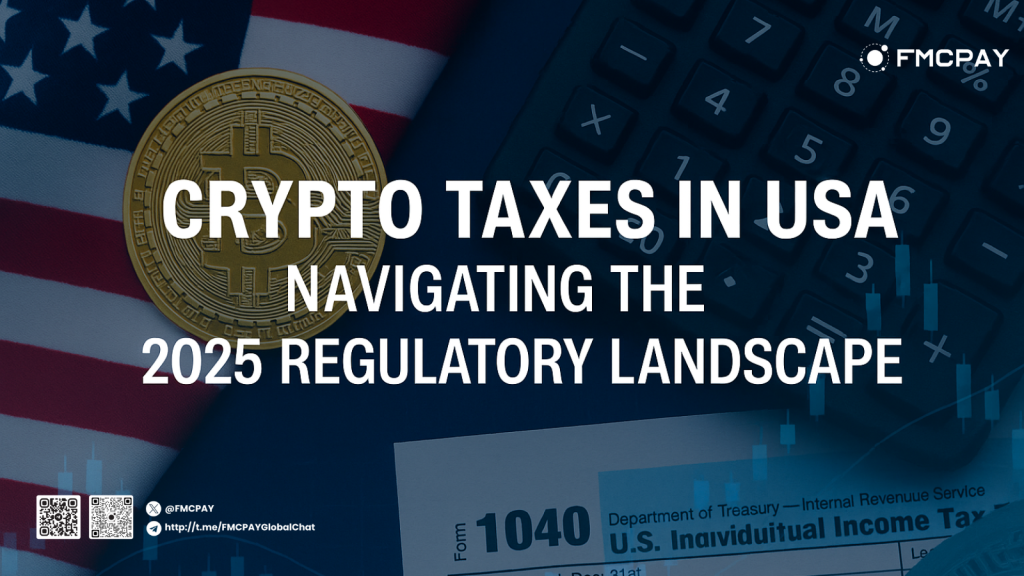In a significant development impacting Crypto Taxes in USA, the U.S. Department of the Treasury and the Internal Revenue Service (IRS) have finalized sweeping new regulations aimed at strengthening tax compliance across the digital asset sector. These updated rules now require cryptocurrency brokers including centralized exchanges, payment processors, and certain DeFi platforms to report detailed user transaction data to the IRS.
Stemming from provisions in the 2021 Infrastructure Investment and Jobs Act, this regulatory shift marks a major milestone in the government’s efforts to tighten oversight of crypto-related tax obligations. The phased rollout will begin on January 1, 2025, representing a critical turning point in how Crypto Taxes in USA are tracked, enforced, and reported.
1. Key Highlights of the New Regulations
As part of the broader regulatory shift in crypto taxes in USA, the IRS has introduced Form 1099-DA, specifically designed for digital asset transactions.
Starting in 2025, all cryptocurrency brokers including centralized exchanges, custodians, and certain payment processors must report gross proceeds from users’ crypto sales. This standardizes crypto reporting in line with traditional financial assets such as stocks and mutual funds.
1.1. Phased Implementation Timeline
The IRS has adopted a two-phase rollout to implement the most comprehensive changes to crypto taxes in USA to date. This measured approach allows brokers, exchanges, and investors ample time to adapt to new regulatory expectations while ensuring a more robust and transparent tax system for digital assets.
-
2025: In the first phase, cryptocurrency brokers will be required to report gross proceeds from all digital asset sales and exchanges. This includes centralized exchanges, custodians, and potentially other intermediaries who facilitate crypto transactions. The introduction of Form 1099-DA in this phase marks a pivotal shift, placing digital assets under the same reporting standards as traditional financial instruments like stocks and bonds.
-
2026: The second phase of the rollout goes a step further by mandating brokers to report cost basis information and calculate capital gains or losses for each reportable crypto transaction. This will enable the IRS to determine individual tax liabilities more accurately and close long-standing compliance gaps within the digital asset economy.
Together, these steps represent a major leap forward in the enforcement of crypto taxes in USA, equipping the IRS with the tools it needs to track, verify, and assess taxpayer compliance with unprecedented precision. For both platforms and investors, this transition underscores the importance of preparation: maintaining thorough records, using compliant software, and staying updated on federal guidance will be essential.
As this new tax framework takes effect, those operating in the crypto space must treat regulatory alignment not as an afterthought, but as a critical element of responsible participation in the U.S. digital economy.
1.2. Stablecoin Transaction Threshold
As stablecoins continue to gain traction across decentralized finance (DeFi), cross-border remittances, and everyday consumer transactions, the IRS has moved to address a critical regulatory gap. Under the latest rules governing crypto taxes in USA, a $10,000 reporting threshold has been introduced for transactions involving stablecoins. This means that any stablecoin transfer exceeding this amount must be reported by brokers, custodians, or other intermediaries handling the transaction.
This threshold applies not only to sales but also to transfers, payments, and conversions involving stablecoins such as USDT, USDC, DAI, and others. The aim is to ensure that high-value stablecoin activity is no longer exempt from oversight simply because these assets maintain price stability. By applying the same tax surveillance and disclosure requirements used for volatile cryptocurrencies, the IRS is reinforcing that stablecoin usage falls squarely within the domain of crypto tax compliance in the USA.
Historically, stablecoins have operated in a regulatory gray zone widely used in large-scale transfers, OTC trades, and yield farming strategies without the same level of scrutiny as Bitcoin or Ethereum. Their perceived stability made them popular among traders and institutions, but also created a loophole in the enforcement of crypto taxes in USA. The new threshold effectively closes that gap, sending a clear message: price stability does not equal regulatory exemption.
From a policy perspective, this move reflects the IRS’s broader shift toward uniform treatment of all digital assets, regardless of their volatility or function. Whether used as a store of value, a medium of exchange, or a liquidity tool in DeFi protocols, stablecoins are now explicitly part of the taxable ecosystem under U.S. federal law.
For investors, platforms, and developers alike, this change underscores the importance of maintaining comprehensive records for stablecoin transactions, especially when dealing with large amounts. As crypto taxes in USA continue to evolve, regulatory agencies are making it clear that transparency and traceability will be enforced consistently across all types of tokens, technologies, and transaction sizes.
1.3. Expanded Scope of Taxable Crypto Events
The latest IRS regulations have introduced a much-needed layer of clarity on what qualifies as a taxable event under crypto taxes in USA, signaling a decisive shift in how digital asset activity is treated under federal tax law. No longer confined to the simple act of selling cryptocurrency for fiat, the definition of taxable crypto events has expanded to encompass a broad spectrum of blockchain-based actions many of which were previously misunderstood or inconsistently reported.
Under the revised framework for crypto tax compliance in the USA, the following activities are now explicitly considered taxable:
-
Swapping one cryptocurrency for another, such as trading Ethereum for Bitcoin or exchanging altcoins on decentralized exchanges. Even though no fiat is involved, these transactions generate capital gains or losses and must be reported.
-
Earning staking or mining rewards, which the IRS classifies as income. Whether the tokens are auto-compounded or manually withdrawn, these earnings are taxed based on their fair market value at the time of receipt.
-
Using cryptocurrency to purchase goods or services, regardless of transaction size or merchant type. This includes buying coffee with Bitcoin, paying for freelance work in stablecoins, or using crypto-based debit cards. Each of these transactions may trigger a capital gain or loss event, depending on the cost basis of the asset used.
-
Receiving airdrops or tokens from hard forks, which are also considered taxable income when the recipient gains control over the assets.
By officially defining these activities as taxable, the IRS is working to eliminate the long-standing ambiguity that once surrounded digital asset taxation. These changes significantly broaden the reach of crypto taxes in USA, ensuring that virtually every use case trading, earning, spending, or receiving crypto falls under the jurisdiction of tax reporting requirements.
The IRS’s stance also emphasizes the importance of accurate recordkeeping, as taxpayers will need to track acquisition prices, holding periods, and market values at the time of each event. Without detailed records, it becomes difficult to calculate liabilities correctly, potentially resulting in underpayment or exposure to penalties.
For both casual users and high-frequency traders, these expanded definitions reinforce the fact that crypto activity is no longer an informal or “gray market” zone in the eyes of U.S. tax authorities. Instead, it is a regulated space where crypto taxes in USA are expected to be applied with the same diligence as traditional financial instruments.
As digital assets continue to evolve, investors and businesses must stay vigilant and informed, ensuring that every transaction no matter how small is evaluated through the lens of federal crypto tax laws in the USA.
2. Implications for Crypto Investors
As the U.S. government ramps up enforcement of digital asset regulations, the impact of the new rules on crypto taxes in USA will be deeply felt by individual investors. While the changes aim to make tax filing more straightforward through standardized forms and clearer guidelines, they also bring heightened regulatory scrutiny and increased responsibility for taxpayers.

2.1. Easier Reporting, But Less Anonymity
The rollout of standardized tax forms most notably Form 1099-DA marks a pivotal shift in how investors fulfill their reporting duties under the evolving framework of crypto taxes in USA. This new form is designed to streamline tax reporting by automatically capturing key data points such as gross proceeds, cost basis, and capital gains from digital asset transactions. By aligning crypto with traditional financial instruments like stocks and bonds, the IRS aims to reduce administrative friction for taxpayers while ensuring greater accuracy and consistency in reporting.
However, this modernization comes with a clear trade-off: a dramatic reduction in the privacy once associated with cryptocurrency ownership and trading. Under the new rules, crypto brokers are legally obligated to share user-level transaction data directly with the IRS regardless of whether the investor independently reports it or not. This includes not only centralized exchanges but potentially any platform or service that facilitates the transfer or custody of digital assets.
As a result, the era of pseudonymous crypto activity is coming to an end, replaced by an infrastructure where tax authorities have real-time access to transaction histories across wallets, platforms, and asset types. The IRS’s ability to cross-reference third-party reports with taxpayer filings will increase detection of underreporting, misreporting, or outright evasion.
For investors, this signals a new era of accountability in crypto tax compliance in the USA. It’s no longer sufficient to self-declare selectively or rely on the fragmented records from various exchanges. Instead, proactive steps such as using integrated crypto tax software, maintaining comprehensive transaction logs, and seeking expert advice have become essential for minimizing risk and staying ahead of enforcement.
In this evolving landscape, transparency is not optional it’s the new standard. As the IRS tightens its grip on digital asset oversight, investors must prepare for a system where crypto taxes in USA are enforced with the same rigor as traditional financial reporting.
2.2. Broader Tax Obligations and Compliance Risks
The regulatory landscape for crypto taxes in USA has evolved dramatically, significantly expanding the list of taxable events related to digital assets. According to the latest IRS guidance, cryptocurrency is no longer treated as a niche or ambiguous asset classit is now fully embedded in the federal tax system, subject to the same rigorous reporting standards as traditional investments.
Under this updated framework, virtually every form of digital asset activity may trigger a tax obligation. Taxable events now explicitly include:
-
Selling cryptocurrency for fiat (e.g., converting Bitcoin to USD)
-
Swapping one crypto for another, even if no fiat is involved
-
Receiving staking rewards, mining income, or airdropped tokens
-
Using crypto to pay for goods and services, regardless of value
-
Gifting digital assets (depending on the amount and recipient)
What once seemed like fringe use cases are now under the microscope. These clarified definitions eliminate previous gray areas and place a far greater compliance burden on both retail and institutional investors in the United States. In essence, if you’re using, trading, or earning crypto in any way, you are likely creating a tax event that must be tracked, calculated, and reported.
The failure to comply with these new expectations around crypto taxes in USA can carry serious consequences. Investors who misreport or underreport their digital asset activity face potential IRS audits, back taxes, interest charges, and financial penalties even retroactively. As broker reporting becomes more sophisticated and interconnected, discrepancies between investor self-reports and third-party data will be easier for the IRS to identify.
To avoid these risks, investors are strongly encouraged to:
-
Maintain detailed transaction records, including timestamps, asset values, wallet addresses, and transaction purposes
-
Use crypto tax software that can consolidate data from multiple wallets and exchanges
-
Work with tax professionals who specialize in crypto taxes in USA, especially for complex activities like DeFi, NFTs, or multi-jurisdictional holdings
In this new regulatory era, ignorance is no longer a viable excuse. The IRS has made it clear: compliance is mandatory, and enforcement will only intensify in the coming years. For crypto investors operating in the U.S., understanding and adhering to the rules is not just smart it’s non-negotiable.
3. Industry Response and Future Outlook
The rollout of new federal rules surrounding crypto taxes in USA has not gone unchallenged. While the government emphasizes transparency, compliance, and closing tax gaps, the crypto industry has responded with a mix of caution, concern, and calls for refinement. As these regulations take hold, the tension between regulatory oversight and blockchain’s decentralized ethos has become more visible fueling both legal revisions and political action.

3.1. Industry Pushback on Broad Definitions
A major point of contention in the ongoing debate surrounding crypto taxes in USA is the IRS’s expansive and, according to many, overly broad definition of “brokers” under the new tax reporting framework. Initially, the classification extended well beyond centralized cryptocurrency exchanges and custodial platforms. It included a wide array of entities such as DeFi protocols, wallet developers, miners, validators, and even open-source software providers many of whom lack access to customer identities, transaction-level metadata, or the infrastructure to comply with federal reporting standards for crypto taxes in USA.
Leaders across the crypto industry and blockchain advocacy organizations have strongly opposed this approach, arguing that it fundamentally misrepresents how decentralized technologies operate. They contend that applying traditional financial reporting requirements to decentralized actors is not only technically impractical but also legally questionable particularly for those who simply provide permissionless infrastructure without maintaining custody or control over users’ assets. For these stakeholders, the proposed treatment under crypto taxes in USA risks imposing impossible obligations on entities that were never meant to function like regulated intermediaries.
Privacy concerns further amplify industry resistance. The mandatory reporting of detailed, transaction-level data to the IRS regardless of how the transaction was initiated or by whom raises red flags about user anonymity. This requirement could force disclosure of wallet activity, behavioral patterns, and financial movements, ultimately threatening the pseudonymous nature of blockchain technology. Many fear that if these measures remain unchecked, they will discourage user participation, drive capital and developers away from U.S.-based crypto platforms, and hinder innovation in a sector where the U.S. once led globally.
In light of these challenges, there is growing consensus within the blockchain community that crypto taxes in USA must be designed with the unique characteristics of decentralized systems in mind. Advocates are calling for a risk-based, context-aware framework that distinguishes clearly between custodial service providers and non-custodial platforms. Without this critical nuance, overregulation could have far-reaching consequences—stalling growth, deterring startups, and pushing critical crypto innovation beyond U.S. borders.
Notably, the crypto industry is not opposed to taxation itself. Most stakeholders support the development of a clear and enforceable tax regime. However, they argue that for crypto taxes in USA to be effective and sustainable, regulatory definitions must evolve in tandem with technological realities. Only then can the United States ensure that its crypto tax policies are both legally enforceable and globally competitive, preserving its role as a leader in financial innovation.
3.2. Government Response and Legal Adjustments
A major point of contention in the ongoing debate surrounding crypto taxes in USA is the IRS’s expansive and, according to many, overly broad definition of “brokers” under the new tax reporting framework. Initially, the classification extended well beyond centralized cryptocurrency exchanges and custodial platforms. It included a wide array of entities such as DeFi protocols, wallet developers, miners, validators, and even open-source software providers many of whom lack access to customer identities, transaction-level metadata, or the infrastructure to comply with federal reporting standards for crypto taxes in USA.
Leaders across the crypto industry and blockchain advocacy organizations have strongly opposed this approach, arguing that it fundamentally misrepresents how decentralized technologies operate. They contend that applying traditional financial reporting requirements to decentralized actors is not only technically impractical but also legally questionable particularly for those who simply provide permissionless infrastructure without maintaining custody or control over users’ assets. For these stakeholders, the proposed treatment under crypto taxes in USA risks imposing impossible obligations on entities that were never meant to function like regulated intermediaries.
Privacy concerns further amplify industry resistance. The mandatory reporting of detailed, transaction-level data to the IRS regardless of how the transaction was initiated or by whom raises red flags about user anonymity. This requirement could force disclosure of wallet activity, behavioral patterns, and financial movements, ultimately threatening the pseudonymous nature of blockchain technology. Many fear that if these measures remain unchecked, they will discourage user participation, drive capital and developers away from U.S.-based crypto platforms, and hinder innovation in a sector where the U.S. once led globally.
In light of these challenges, there is growing consensus within the blockchain community that crypto taxes in USA must be designed with the unique characteristics of decentralized systems in mind. Advocates are calling for a risk-based, context-aware framework that distinguishes clearly between custodial service providers and non-custodial platforms. Without this critical nuance, overregulation could have far-reaching consequences stalling growth, deterring startups, and pushing critical crypto innovation beyond U.S. borders.
Notably, the crypto industry is not opposed to taxation itself. Most stakeholders support the development of a clear and enforceable tax regime. However, they argue that for crypto taxes in USA to be effective and sustainable, regulatory definitions must evolve in tandem with technological realities. Only then can the United States ensure that its crypto tax policies are both legally enforceable and globally competitive, preserving its role as a leader in financial innovation.
Conclusion
As the United States sharpens its regulatory focus on digital assets, the landscape for crypto taxes in USA is entering a new era defined by stricter compliance requirements, broader tax obligations, and unprecedented IRS visibility into blockchain transactions. For investors, traders, developers, and businesses alike, the message is clear: crypto is no longer operating in a regulatory gray zone.
To successfully navigate this evolving environment, stakeholders must stay informed, adapt quickly, and take proactive steps toward full compliance. This includes:
-
Maintaining accurate transaction records
-
Leveraging IRS-compliant tax software
-
Consulting with professionals experienced in crypto tax laws in the USA
-
Monitoring legal and policy developments that may impact reporting requirements
The cost of inaction is rising, and ignorance is no longer a defense. Whether you’re a seasoned crypto investor or just entering the space, understanding how crypto taxes in USA apply to your activities is now essential not optional. Stay ahead of the curve with FMCPAY News For real-time updates, expert insights, and practical tips on how to remain compliant in a fast-changing crypto tax environment, follow FMCPAY News. We break down complex regulations, track emerging legislation, and deliver the latest on how crypto taxes in USA are reshaping the future of digital finance.


